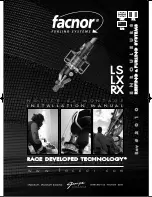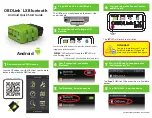
Section 2 - On the Water
90-8M0093150
eng
MAY 2014
Page 15
2. Examples of poor ventilation while the boat is moving:
a -
Operating the boat with the trim
angle of the bow too high
b -
Operating the boat with no forward
hatches open (station wagon
effect)
Safe Boating Suggestions
In order to safely enjoy the waterways, familiarize yourself with local and all other governmental boating regulations and
restrictions, and also consider the following suggestions.
Mercury Marine strongly recommends that all powerboat operators complete a boating safety course. Courses are offered in
the U.S.A. by the U.S. Coast Guard Auxiliary, the Power Squadron, the Red Cross, and your state or provincial boating law
enforcement agency. Inquiries may be made to the Boating Safety Resource Center (
).
•
Know and obey all nautical rules and laws of the waterways.
•
Perform safety checks and required maintenance.
Follow a regular schedule and ensure that all repairs are properly
made.
•
Check safety equipment onboard.
Here are some suggestions of the types of safety equipment to carry when boating:
Approved fire extinguishers
Paddle or oar
Signal devices: flashlight, rockets or flares, flag, and whistle or horn
Transistor radio
Tools necessary for minor repairs
First aid kit and instructions
Anchor and extra anchor line
Waterproof storage containers
Manual bilge pump and extra drain plugs
Spare operating equipment, batteries, bulbs, and fuses
Drinking water
Compass and map or chart of the area
•
Watch for signs of weather change and avoid foul weather and rough
‑
sea boating.
•
Tell someone where you are going and when you expect to return.
•
Passenger boarding.
Stop the engine whenever passengers are boarding, unloading, or are near the back (stern) of the
boat. Shifting the drive unit into neutral is not sufficient.
•
Use personal flotation devices
. Federal law requires that there be a U. S. Coast Guard–approved, wearable‑type life
jacket (personal flotation device), correctly sized and readily accessible for every person aboard, plus a throwable cushion
or ring. We strongly advise that everyone wear a life jacket at all times while in the boat.
•
Prepare other boat operators.
Instruct at least one person aboard in the basics of starting and operating the engine and
handling the boat in case the driver becomes disabled or falls overboard.
•
Do not overload your boat.
Most boats are rated and certified for maximum load (weight) capacities. Refer to your boat
capacity plate. Know your boat’s operating and loading limitations. Know if your boat will float if full of water. When in
doubt, contact your authorized Mercury Marine dealer/distributor or the boat manufacturer.
•
Ensure that everyone in the boat is properly seated.
Do not allow anyone to sit or ride on any part of the boat that was
not intended for such use. This includes the backs of seats, gunwales, transom, bow, decks, raised fishing seats, and any
rotating fishing seat; anywhere that sudden unexpected acceleration, sudden stopping, unexpected loss of boat control, or
sudden boat movement could cause a person to be thrown overboard or into the boat. Ensure that all passengers have a
proper seat and are in it before any boat movement.
•
Never be under the influence of alcohol or drugs while boating. It is the law.
Alcohol or drugs impairs your judgment
and greatly reduces your ability to react quickly.
•
Know your boating area and avoid hazardous locations.
a
b
21628
















































